June 15, 2025 | 08:31 GMT +7
June 15, 2025 | 08:31 GMT +7
Hotline: 0913.378.918
June 15, 2025 | 08:31 GMT +7
Hotline: 0913.378.918
The Government recently approved the "Sustainable Development Project for One Million Hectares of Specialized, Low-Emission High-Quality Rice Farming in association with Green Growth in the Mekong Delta region by 2030."
With the aim of achieving the project's overarching goal, the agricultural science sector will contribute specialized knowledge, transfer technology, forecast risk factors, and consequently provide policy consultation for sustainable rice farming. On the other hand, detailed policies are necessary to enhance the reputation of Vietnamese rice, thereby increasing the competitiveness of Vietnamese rice products in the international market.
The Vietnam Agriculture Newspaper conducted an interview with Mr. Dao The Anh, Deputy Director of the Vietnam Academy of Agricultural Sciences, and Mr. Tran Cong Thang, General Director of the Institute of Policy and Strategy for Agriculture and Rural Development, regarding aforementioned issues.
Can you elaborate on the objectives and key points of the "Sustainable Development Project for One Million Hectares of Specialized, Low-Emission High-Quality Rice Farming in association with Green Growth in the Mekong Delta region by 2030"?
Mr. Tran Cong Thang: The Prime Minister officially approved the "Sustainable Development Project for One Million Hectares of Specialized, Low-Emission High-Quality Rice Farming in association with Green Growth in the Mekong Delta region by 2030" on November 27th. The project's title refers to high quality and low emissions, clearly establishing its objectives.
The project's main objective is to reorganize production and improve the quality of Vietnamese rice. The rice industry was previously focused on acquiring high-quality certifications for Vietnamese rice products. However, we must shift our attention towards increasing the value of the rice industry, thereby providing high economic value for rice farmers. Additionally, reorganizing production to create specialized rice farming areas, standardizing the rice farming stages from seed selection to production processes, establishing production unit codes, and standardizing emission reduction processes are planned under the project.
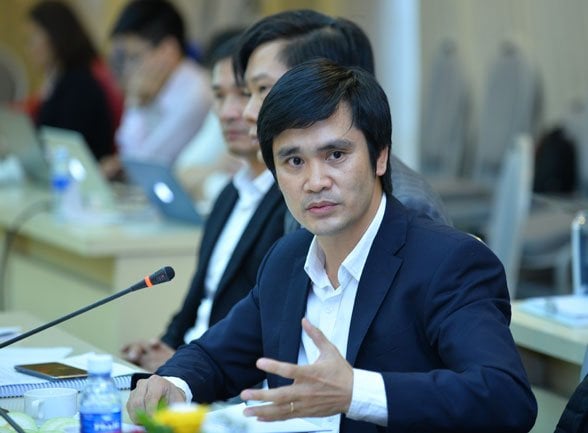
Mr. Tran Cong Thang, General Director of the Institute of Policy and Strategy for Agriculture and Rural Development.
The second aspect of the project concerns low emissions. Accordingly, the project sets specific goals for reducing input resources, with an emphasis on chemicals, decreasing water consumption, and recycling straw. Under the project, all of the harvested straw will be transported out of the production areas and recycled to create added value. Consequently, we must aim to achieve at least 20% low-emission rice within Vietnam's export structure by 2030. This is a crucial objective to elevate the position and value of Vietnamese rice.
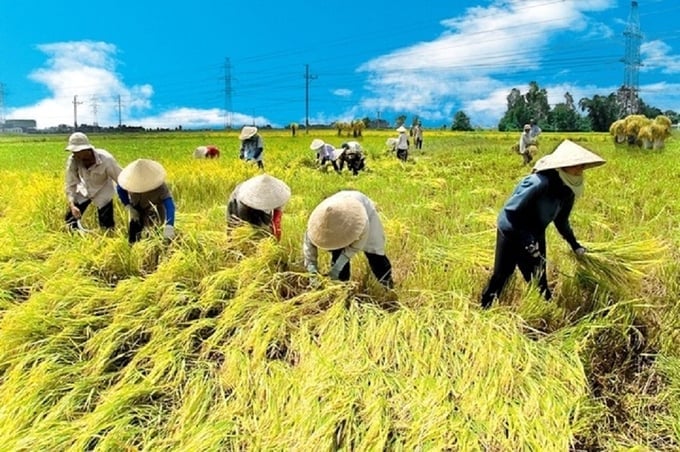
The project aims to comprehensively transform the rice industry.
Regarding its social objective, the project aims to provide training in sustainable farming practices for approximately one million farming households by 2030, which is also a key millennium goal for Vietnam. We must aim to produce rice to meet consumption demand as well as reduce emissions. Moreover, we must move towards transforming the rice industry as a whole, which will involve rice farmers, cooperatives, and businesses, and the ultimate goal of increasing income for rice farmers and businesses.
Do you assess that low-emission rice production is a current global trend? And how successful is the low-emission rice production model worldwide?
Mr. Dao The Anh: Studies have shown that low-emission rice production represents an important global trend, especially in the context of growing global concerns regarding environmental and climate change issues. Notably, emission reduction in rice production was was widely discussed by international experts and researchers during the 6th International Rice Congress 2023 held in the Philippines. This discussion underscores the importance and advantages of the transition towards a low-emission rice production model.
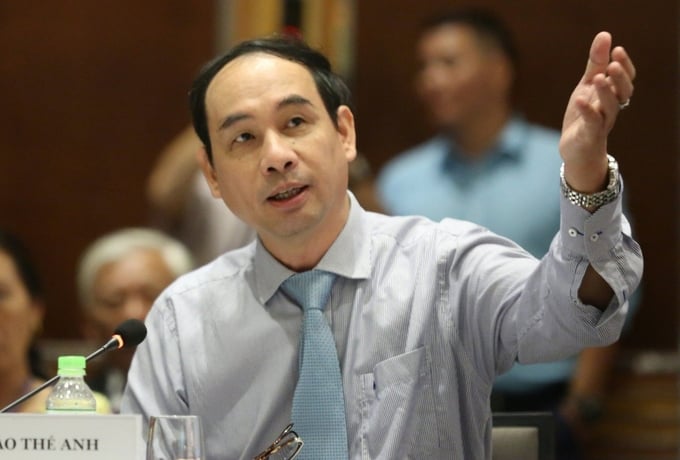
Mr. Dao The Anh, Deputy Director of the Vietnam Academy of Agricultural Sciences.
Wet rice, primarily cultivated in Asia and Africa, is facing considerable difficulties due to the prevalence of small-scale and dispersed farming households. The promotion of low-emission rice production requires close collaboration among the government, businesses, and farming communities.
Vietnam, with its initiative for low-emission rice models, has remained at the forefront of implementing this trend. However, the implementation process also poses significant challenges. Additionally, the international community has commended Vietnam's innovative efforts in building a sustainable rice production model with a focus on reducing emissions, and efficiently utilizing resources.
The foremost challenge currently lies in identifying suitable technologies and certification methods to ensure that rice production meets low-emission standards and gains access to the Carbon market. Despite the substantial certification costs, I believe that with concerted effort and support, Vietnam can overcome these challenges to achieve our objectives.
In addition to the carbon credit system, what other challenges does Vietnam have to face?
Mr. Tran Cong Thang: In addition to the measurement-reporting-verification (MRV) system, we also need to consider the exchange of carbon credits from low-emission rice production. Reportedly, the World Bank (WB) is ready to assist Vietnam in training, and subsequently introducing Vietnam to potential carbon credit buyers.
Despite its difficulties, I believe that the development of the MRV system is suitable project for the agricultural sector. Accordingly, the project aligns with prevailing global trends and with Vietnam's commitment to developing sustainable rice production. The agricultural sector was previously focused on increasing productivity and expanding production areas, leading to the excessive use of input resources such as fertilizers and pesticides. As a result, it is imperative that we address and adjust this approach.
Moreover, this project demonstrates Vietnam's dedication to fulfilling climate change commitments outlined in the Nationally Determined Contributions (NDC) report. The project also contributes significantly to Vietnam's goal of achieving net-zero emissions by 2050.
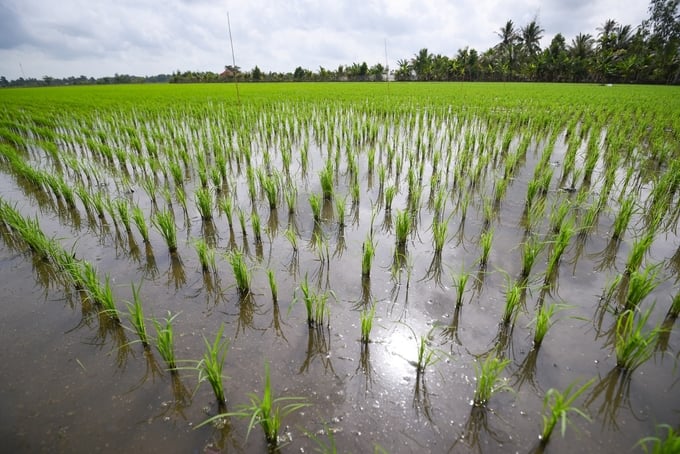
The successful implementation of the project will stand as a remarkable achievement.
According to the World Bank, this is a large-scale, unprecedented project in Vietnam, with a significantly larger area compared to smaller projects in the past. I believe that we are facing challenges in terms of changing farmers' habit. The VnSAT project, one of the major projects deployed by the Ministry of Agriculture and Rural Development with a focus on rice production in the Mekong Delta and coffee production in the Central Highlands, will assist in this endeavour. After several years of implementation, the project has achieved its set targets in terms of production criteria and product output. The VnSAT project was sponsored by the World Bank and implemented across 13 provinces of Vietnam between 2015 and 2022. This project serves as a foundation for the implementation of the One Million Hectares Rice Project.
Furthermore, Vietnam must initiate the process of production transformation by organizing farmers into cooperatives and subsequently, businesses. Notably, an often overlooked aspect is the project's requirement for the participation of qualified businesses.
Regarding funding for the project, we will focus on consolidating the 184,000-hectare VnSAT project area from 2024 to 2025. Subsequently, we plan to expand the project area from 2026 to 2030, which will require a significant amount of investment in infrastructure. This includes substantial investment in improving and modernizing the irrigation system, a crucial factor in water conservation.
Another challenge is the volatility of the rice market. Notably, we have observed a productive market with increasing rice prices in 2023. However, it is challenging to predict the market developments in the future. As a result, we must detail a development roadmap towards 2030, and request commitment from central agencies, scientific organizations, and farmers. The target of one million hectares is ambitious in comparison with the Mekong Delta's total land area of 1.6 million hectares. This is also a significant factor motivating the World Bank to accompany Vietnam in the implementation process. Consequently, the successful implementation of the project will stand as a remarkable achievement.
Can you share on the solutions that countries around the world are implementing to promote ecological agriculture and reduce agricultural emissions?
Mr. Dao The Anh: Ecological agriculture is relatively diverse, with the core principle being the utilization of the ecological potentials of different climate regions. Accordingly, rice production is primarily concentrated in the delta regions. There is a concerted global effort to research the System of Rice Intensification (SRI). Vietnam has applied SRI extensively in the Northern region, with a small number of achievements in the Southern region. The SRI approach in the Northern region includes reducing input costs for seed and fertilizer, implementing integrated pest management, and alternating wet and dry irrigation. On the other hand, the SRI approach in the Southern region focuses on the "one reduction, three increases," and the "one must, five reductions" principles. These approaches have been effectively implemented thanks to Vietnam's agricultural extension system, which has been recognized as modern and scientific. Loc Troi Group recently introduced a small-scale solution for sustainable rice farming in accordance with the SRP Standard for Sustainable Rice Prouction (SRP). I believe that Vietnam possesses the technical solutions to realize this goal; the remaining challenge is the expansion to a larger scale. The deciding factor lies in our ability to mobilize one million farming households to adopt these practices.
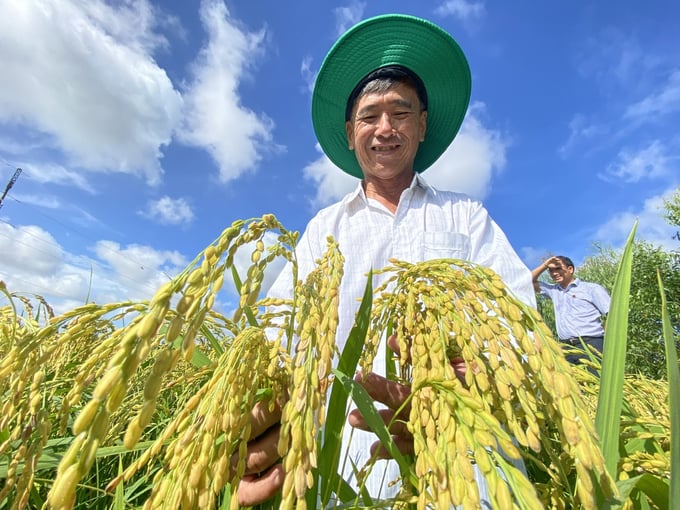
Another issue is the reduction of emissions through the use of by-products such as rice straw. Researchers have proposed several processes to be applied in the Mekong Delta region. In contrast with the individualistic approach in the past, whereby the arbitrary burning of post-harvest materials can lead to high carbon emissions, the International Rice Research Institute (IRRI) will collaborate with Vietnam to find comprehensive emission reduction measures from production to post-production under the One Million Hectares Rice Project. The majority of countries around the world are applying fragmented solutions, and Vietnam is has the potential to be the first country to follow a comprehensive approach. I hope that Vietnam can succeed to share its experience with countries worldwide.
Due to the project's ambitious goals, the involvement of every stakeholder is needed. How do you think we can mobilize the participation of ministries, local governments, and international organizations for this project?
Mr. Tran Cong Thang: According to my observations, the leadership of the Government and the Ministry of Agriculture and Rural Development have maintained an open-minded approach when participating in the project. These parties include the Ministry, Institutes, Universities, relevant Departments, and Sub-Departments. We have also invited relevant emission control agencies such as the Ministry of Natural Resources and Environment, international organizations such as the World Bank, FAO, or organizations with ongoing projects in Vietnam. Furthermore, the twelve provinces of the Mekong Delta have actively participated in the project by organizing discussions and meetings with representatives from the Ministry of Agriculture and Rural Development. To date, this is the first project in Vietnam to feature the comprehensive and active participation from local governments and businesses, with open and transparent documents.
This project is earning the approval of both domestic and international stakeholders. In my opinion, the Ministry of Agriculture and Rural Development, local governments, businesses, cooperatives, and farmers play an indispensable role in this project. Moreover, businesses, cooperatives, and farmers are decisive factors in producing low-emission rice.
We also need to invest in scientific research. If we are unable to achieve the goal of one million hectares by 2023, reaching 800,000 to 900,000 hectares can still be considered a resounding success. The key lies in the strive for quality, investments in post-harvest, logistics, and emission reduction. Consequently, both the value and the productivity of rice will significantly increase. According to Minister Le Minh Hoan said, we must consider this project as a multi-valued ecosystem.
What do you think of the role of Vietnamese universities, institutes and researchers in the project? What contributions can Vietnamese scientists make to promote effective implementation of the project?
Mr. Dao The Anh: We are moving towards sustainable development with the primary focus on rice grains and farmers. The goals include ensuring national food security, providing nutrition to the population, generating income for farmers, protecting the environment, reducing emissions, and ensuring export quality. Additionally, we must aim to build a high-quality, and environmentally friendly rice brand. This is a prerequisite for further development in the future; because environmentally friendly products are necessary to establish credibility with consumers.
The Government's Decree No. 98 previously mobilized businesses and farmers to participate in partnerships and collaborations, with limited support and involvement from the government. The One Million Hectares Rice Project is a part of the National Action Plan for the transparent, responsible, and sustainable transformation of the food system by 2030, issued by the Government in March 2023. The role of science and technology in the project's diverse objectives is crucial, requiring inter-sectoral collaboration in terms of production techniques, seed selection, cultivation, post-harvest and value chain management, marketing, value chain development, origin traceability, carbon certification, and support for digital transformation, etc. As a result, the volume of scientific and technological knowledge and information is invaluable, with the potential to completely overhaul the rice production. Accordingly, the rice grain will remain as a key point, supported by science and technology. We need scientists, institutes, universities, and international organizations to actively support farmers in this transformation.
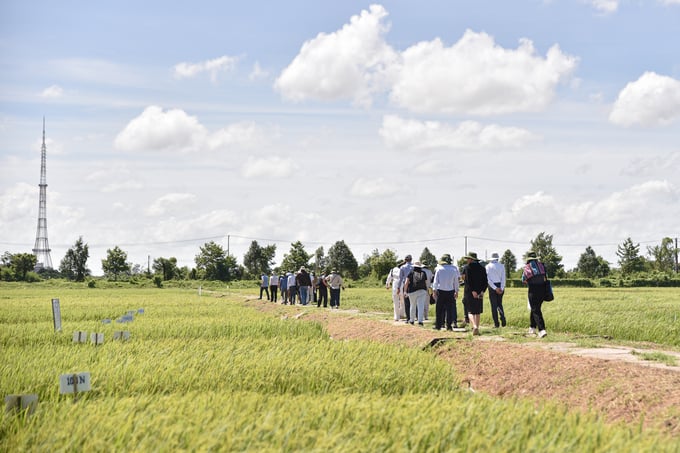
Comprehensive coordination among all stakeholders is necessary to implement the project.
Rice farmers in the Mekong Delta region was previously focused on increasing productivity. Namely, the region boasts an impressive average yield of approximately 6 tons per crop per hectare. Within the last five years, there has been a significant shift towards high-quality rice, a dramatic change brought on by the introduction of high-quality varieties, developed by the Vietnam Academy of Agricultural Sciences and its partners. Notably, these new varieties account for 70 to 80% of the local rice production area. Additionally, this feature has laid the foundation for Vietnam to initiate the One Million Hectares Rice Project. The International Rice Congress 2023 has concluded that Vietnamese rice as having the highest quality worldwide. Thailand and Cambodia have won various awards in the past with their naturally preserved rice varieties. In contrast, Vietnam won this award with the assistance of domestic scientists. The international community holds Vietnamese science in high regard with its achievements in rice varieties as well as other rice production stages.
The two interviewees believe that the project reflects a change in mindset with regards to the development of sustainable agriculture. We are currently employing an open-minded approach, and mobilizing all social resources. Moreover, agricultural products are the joint responsibility of farmers, the Ministry of Agriculture and Rural Development, local governments as well as the Healthcare, Industry and Trade, Environment, and Science and Technology sectors. Consumers are also partially responsible when they purchase rice products.
Consequently, the Government is responsible for encouraging the participation of social actors and the international community. The two experts believe that the Government must to create a favorable environment for this actors, and acknowledge their contributions. These are the sources of science and technology, intellectual capital, and economic resources that Vietnam requires.
Translated by Nguyen Hai Long
![Turning wind and rain into action: [4] Bringing climate bulletins to remote and isolated areas](https://t.ex-cdn.com/nongnghiepmoitruong.vn/608w/files/linhnhp/2025/06/14/1152-z6704423696987_15fd32ffc26d590d204d520c9dac6786-nongnghiep-151141.jpg)
(VAN) The Vietnam Agriculture and Nature Newspaper interviewed Mr. Vu Thai Truong, Acting Head of Climate Change and Environment at UNDP Vietnam, to gain deeper insight into how climate bulletins are delivered to farmers.

(VAN) In Tien Giang, a high-tech shrimp farm has developed a distinctive energy-saving farming model that has yielded promising results.
![Turning wind and rain into action: [3] 300.000 farmers benefit from agro-climatic bulletins](https://t.ex-cdn.com/nongnghiepmoitruong.vn/608w/files/news/2025/06/12/e5a48259d6a262fc3bb3-nongnghiep-125122.jpg)
(VAN) The agro-climatic bulletin has become a valuable tool for farmers in the Mekong Delta. After more than five years of implementation, the initiative is gradually being expanded nationwide.
![Turning wind and rain into action: [2] Providing forecasts to the people](https://t.ex-cdn.com/nongnghiepmoitruong.vn/608w/files/news/2025/06/12/e5a48259d6a262fc3bb3-nongnghiep-103927.jpg)
(VAN) In addition to improving the quality of hydrometeorological forecasts, putting forecast bulletins into practical use is crucial for production and disaster prevention.

(VAN) Blue carbon is receiving attention for its rapid absorption capacity and vast potential. It represents a promising nature-based solution to respond to climate change.
/2025/06/11/3507-1-161904_583.jpg)
(VAN) Seagrass beds and coral reefs serve as 'cradles' that nurture life in the ocean depths, creating rich aquatic resources in Vietnamese waters.
![Turning wind and rain into action: [1] Forecasting for farmers](https://t.ex-cdn.com/nongnghiepmoitruong.vn/608w/files/news/2025/06/11/e5a48259d6a262fc3bb3-nongnghiep-111919.jpg)
(VAN) Weather is no longer just a matter of fate. Forecasts have now become an essential companion for farmers in every crop season.